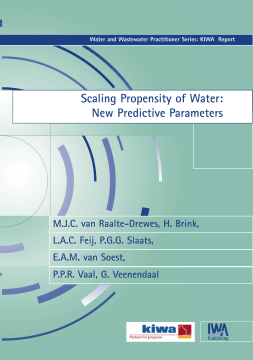
BOOK
Scaling Propensity of Water
M. J. C. van Raalte-Drewes | H. Brink | LAC Feij | PGG Slaats | E. A. M. van Soest | P. P. R. Vaal | G. Veenendaal
(2004)
Additional Information
Book Details
Abstract
The commonly used Saturation Index calculated at 10°C (SI10) is not suitable for practical situations. New parameters have been developed for simple and rapid analysis of calcium carbonate precipitation (scaling) phenomena which occur during the heating of drinking water: TPCC90 (Theoretically Precipitable Calcium Carbonate at 90°C) SI90 (Saturation Index at 90°C) NI (Nucleation Index) PPCC (Practically Precipitable Calcium Carbonate) Both TPCC90 and SI90 describe the hydrodynamic driven force for the scaling reaction. The nucleation index indicates at what rate calcium carbonate precipitation is accelerated by nuclei present in the water. Finally, the PPCC is a measurement under practical conditions, determining the rate of scaling. The suitability of these parameters for predicting scaling was assessed and detailed results are presented in this publication.
Table of Contents
| Section Title | Page | Action | Price |
|---|---|---|---|
| Contents | 5 | ||
| Summary | 2 | ||
| 1.0 New parameters to determine the scaling potential of water | 6 | ||
| 2.0 Recommendations to prevent scaling | 8 | ||
| 2.1 Approach to establish new recommendations | 8 | ||
| 2.2 Relation between results of determination methods and practical experience | 9 | ||
| 2.3 Recommendations | 11 | ||
| 3.0 Examples of applications | 12 | ||
| 3.1 Determination of the benefits and necessity of water treatment/conditioning | 12 | ||
| 3.2 Answering complaints of users about calcium carbonate precipitation | 14 | ||
| 3.3 Optimisation of conditioning processes | 15 | ||
| 4.0 How to use the new scaling prediction methods | 18 | ||
| 4.1 Implementation to prevent client complaints | 18 | ||
| 4.2 Implementation to determine the benefits and necessity of conditioning | 20 | ||
| 4.3 Implementation to optimise conditioning and filtration processes | 21 | ||
| Conditioning processes | 21 | ||
| Filtration processes | 21 | ||
| 5.0 Conclusions | 15 | ||
| Literature | 17 |
